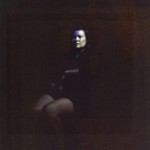To record The Hope Six Demolition Project PJ Harvey created an artisan Big Brother: an inversion in which the contestants, with no fear of eviction, quietly get on with the serious business of creating Art while viewers read too much into it until they’re asked to leave. It’s a distancing technique, much like those post punk groups first nicked from visual artists nearly forty years ago. Harvey has always insisted her songs are not entirely personal and this was a profitable way of reminding us thickos.
The astute among you will have already realised Harvey is a serious artist dealing with serious subjects on the release of her anti-war album, Let England Shake, which was followed by trips to war zones and a volume of poetry. If so, you may consider the Somerset House sessions a heavy-handed gesture that betrays the performer’s distrust of her audience. You may think the glass wall she erected suggests a haughty disdain for the peasants. More charitable observers may have seen self-parody in the very literal liberal bubble.
Recording In Progress spoke of the scrutiny we give the motives of contemporary public figures, but her music has long defied autobiographical interpretation. Songs such as ‘The Wind’ and ‘White Chalk’, to name but two, are like fragments of letters from past generations, left to be deciphered. Chancing upon their clues can elicit joy and even renew purpose.
So what of this new album? It’s one for those who slow as they pass twisted car crashes; who can’t keep a straight face at Remembrance services. Moments of disquiet, born of helpless guilt, are swiftly assuaged by a high church Anglican holiness that finds the subjects’ solemn dignity. Remember, heaven is a place without hope. Jesus, though, it’s mostly a riot. Imagine if the Velvet Underground had used ‘The Gift’ as a starting point for a concept album of blackly comic short stories.
The horror is reported in a manner so detached, safe and serene, it’s unreal. The gates of hell, the effects of war and litter are all equal. Ghosts of girls walk among survivors swallowing offal. Graffiti in biro predicts the world will end, but this is no apocalypse; it will go on and no-one can be judged. ‘A Line In The Sand’ has a shaken but resolute belief in the possibility of progress. However, Harvey is more convincing when rubbing the human face in its own vomit. The instincts that make us strive to fit in may also override individual conscience. For instance, given a uniform and the right circumstances, we would be likely to commit acts of torture. We may tell ourselves otherwise, to convince ourselves we’re good, but guilt is no less useless a gut reaction than callous humour.
This is travel writing, rather than polemic. The primary comparison is the implied one between the narrator’s habits and those of the people she observes. We aren’t privy to the differences between their past experiences, their expectations and their present. Thus, we get idle glosses on moments in strangers’ lives. Take, for example, the patronising portrait of a native American woman drinking alcohol, fermented sugars being, apparently, a “new painkiller.” More appealingly, travel writing permits hearsay, legend and shadows, where phantasmagoria fascinate the senses. Meddling with magic for escapism has a limit, though. Harvey begins her journey in the back of a car, touring poor streets in Washington. By the end, she’s scrabbling around the back seat for loose change: some small token to pay off a fearful apparition. Is her impulse to help, or to buy herself the right to look away?
Released 15/4/2016




